Volume 9-14 (2020-26)
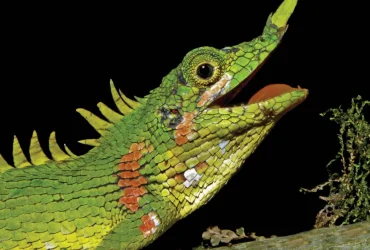 v9i1.225
v9i1.225ISSN: 1800-427X (printed)
eISSN: 1800-427X (online)
DOI:10.47605/tapro.v9i1.225
Submitted date: 27 February 2020
Accepted date: 19 May 2020
Published date: 21 May 2020
Pp. 103–119, pls. 37–42.
A NEW SPECIES OF Lankascincus GREER, 1991 (REPTILIA : SCINCIDAE) WITH AN OVERVIEW OF THE L. gansi GROUP
A. Suneth Kanishka, A. Dineth Danushka & A.A. Thasun Amarasinghe*
*Corresponding author. E-mail: thasun@rccc.ui.ac.id
Abstract
Lankascincus gansi has been considered as a widespread single species, distributed in the wet bioclimatic zone of Sri Lanka (alt. below 1,100 m a.s.l.). After a thorough comparison of morphology and morphometry, we recognised two distinct populations from (i) high-elevations (1,000 m a.s.l.) of the Rakwana Hills and (ii) the south western lowland wet zone [mid-elevations (200–500 m a.s.l.) of the western slopes of the central highlands and the southwestern lowland (0–300 m a.s.l.)]. These are sufficiently different from one another that we restrict the name L. gansi to the lowland rainforest population, and assign a new name to the Rakwana Hills population. We provide a comprehensive re-description for L. gansi based on three topotypes collected from Udugama, Sri Lanka. Considering the lack of morphological distinctiveness and biogeographical isolation we here synonymise L. greeri[i] with [i]L. deignani. A key to the species of the genus Lankascincus is provided.
Key words : Central highlands, mid-elevation, rainforest, South Asia, systematics, taxonomy
Section Editor: Kanishka Ukuwela
LSID:urn:lsid:zoobank.org
eISSN: 1800-427X (online)
DOI:10.47605/tapro.v9i1.225
Submitted date: 27 February 2020
Accepted date: 19 May 2020
Published date: 21 May 2020
Pp. 103–119, pls. 37–42.
A NEW SPECIES OF Lankascincus GREER, 1991 (REPTILIA : SCINCIDAE) WITH AN OVERVIEW OF THE L. gansi GROUP
A. Suneth Kanishka, A. Dineth Danushka & A.A. Thasun Amarasinghe*
*Corresponding author. E-mail: thasun@rccc.ui.ac.id
Abstract
Lankascincus gansi has been considered as a widespread single species, distributed in the wet bioclimatic zone of Sri Lanka (alt. below 1,100 m a.s.l.). After a thorough comparison of morphology and morphometry, we recognised two distinct populations from (i) high-elevations (1,000 m a.s.l.) of the Rakwana Hills and (ii) the south western lowland wet zone [mid-elevations (200–500 m a.s.l.) of the western slopes of the central highlands and the southwestern lowland (0–300 m a.s.l.)]. These are sufficiently different from one another that we restrict the name L. gansi to the lowland rainforest population, and assign a new name to the Rakwana Hills population. We provide a comprehensive re-description for L. gansi based on three topotypes collected from Udugama, Sri Lanka. Considering the lack of morphological distinctiveness and biogeographical isolation we here synonymise L. greeri[i] with [i]L. deignani. A key to the species of the genus Lankascincus is provided.
Key words : Central highlands, mid-elevation, rainforest, South Asia, systematics, taxonomy
Section Editor: Kanishka Ukuwela
LSID:urn:lsid:zoobank.org
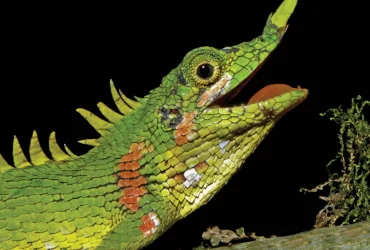 v9i1.224
v9i1.224ISSN: 1800-427X (printed)
eISSN: 1800-427X (online)
DOI:10.47605/tapro.v9i1.224
Submitted date: 29 February 2019
Accepted date: 05 May 2020
Published date: 21 May 2020
Pp. 83–102, pls. 30–36.
A NEW SPECIES OF Dendrelaphis BOULENGER, 1890 (REPTILIA : COLUBRIDAE) FROM THE WET ZONE OF SRI LANKA WITH A REDESCRIPTION OF Dendrelaphis bifrenalis (BOULENGER, 1890)
A. Dineth Danushka, A. Suneth Kanishka, A.A. Thasun Amarasinghe*, Gernot Vogel & Sampath S. Seneviratne
*Corresponding author. E-mail: thasun@rccc.ui.ac.id
Abstract
Examination of the Dendrelaphis bifrenalis populations on Sri Lanka showed that there are two populations that are morphologically different from each other. One population is distributed only in the wet zone forests (hereafter treated as wet zone population), while the other population occurs widely in the dry zone and intermediate zones (hereafter dry zone population). The type series of D. bifrenalis consist of 3 specimens from which the specimen representing the dry zone population was chosen as lectotype, and the wet zone population is described here as a new species. It clearly differs from D. bifrenalis by having a shorter snout, orbit diameter 103–114% of eye–nostril length (vs 77–95%), and larger eye, orbit diameter 21–23% of head length (vs 17–20%). Furthermore it differs by having a temporal stripe stopping just beyond the neck (vs continues behind neck), the absence of black transverse dorsolateral bars on the anterior 1/4th of body (vs prominent), a narrow and pointed snout (vs broad and flat), a divided nasal (vs single), and a ventrolateral stripe continuing up to the tail (vs stopping at the level of the anal plate). This morphological differentiation is supported by the divergence in the mitochondrial NADH dehydrogenase subunit 4 (ND4) region separating clearly with the divergence of 1.70±0.35%. Also, here we resurrect D. effrenis (Werner, 1909) as a valid species, and D. sinharajensis as a junior synonym of it. The holotype of D. sinharajensis was chosen as the neotype of D. effrenis to stabilize nomenclature, and to make it an objective synonym. The third and fourth known specimens of this rare species are reported. A key of the species of the genus Dendrelaphis in Sri Lanka is provided.
Key words : Holotype, island biogeography, lectotype, neotype, syntype, systematic, taxonomy
Section Editor: Ivan Ineich
LSID:urn:lsid:zoobank.org
eISSN: 1800-427X (online)
DOI:10.47605/tapro.v9i1.224
Submitted date: 29 February 2019
Accepted date: 05 May 2020
Published date: 21 May 2020
Pp. 83–102, pls. 30–36.
A NEW SPECIES OF Dendrelaphis BOULENGER, 1890 (REPTILIA : COLUBRIDAE) FROM THE WET ZONE OF SRI LANKA WITH A REDESCRIPTION OF Dendrelaphis bifrenalis (BOULENGER, 1890)
A. Dineth Danushka, A. Suneth Kanishka, A.A. Thasun Amarasinghe*, Gernot Vogel & Sampath S. Seneviratne
*Corresponding author. E-mail: thasun@rccc.ui.ac.id
Abstract
Examination of the Dendrelaphis bifrenalis populations on Sri Lanka showed that there are two populations that are morphologically different from each other. One population is distributed only in the wet zone forests (hereafter treated as wet zone population), while the other population occurs widely in the dry zone and intermediate zones (hereafter dry zone population). The type series of D. bifrenalis consist of 3 specimens from which the specimen representing the dry zone population was chosen as lectotype, and the wet zone population is described here as a new species. It clearly differs from D. bifrenalis by having a shorter snout, orbit diameter 103–114% of eye–nostril length (vs 77–95%), and larger eye, orbit diameter 21–23% of head length (vs 17–20%). Furthermore it differs by having a temporal stripe stopping just beyond the neck (vs continues behind neck), the absence of black transverse dorsolateral bars on the anterior 1/4th of body (vs prominent), a narrow and pointed snout (vs broad and flat), a divided nasal (vs single), and a ventrolateral stripe continuing up to the tail (vs stopping at the level of the anal plate). This morphological differentiation is supported by the divergence in the mitochondrial NADH dehydrogenase subunit 4 (ND4) region separating clearly with the divergence of 1.70±0.35%. Also, here we resurrect D. effrenis (Werner, 1909) as a valid species, and D. sinharajensis as a junior synonym of it. The holotype of D. sinharajensis was chosen as the neotype of D. effrenis to stabilize nomenclature, and to make it an objective synonym. The third and fourth known specimens of this rare species are reported. A key of the species of the genus Dendrelaphis in Sri Lanka is provided.
Key words : Holotype, island biogeography, lectotype, neotype, syntype, systematic, taxonomy
Section Editor: Ivan Ineich
LSID:urn:lsid:zoobank.org
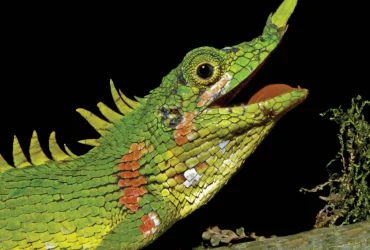 v9i1.223
v9i1.223ISSN: 1800-427X (printed)
eISSN: 1800-427X (online)
DOI:10.47605/tapro.v9i1.223
Submitted date: 15 March 2020
Accepted date: 05 May 2020
Published date: 21 May 2020
Pp. 71–82, pls. 25–29.
A NEW DIMINUTIVE DAY GECKO SPECIES OF THE GENUS Cnemaspis STRAUCH, 1887 (REPTILIA : GEKKONIDAE) FROM PILIKUTTUWA, NEAR THE CAPITAL OF SRI LANKA
A.A. Thasun Amarasinghe* & Suranjan Karunarathna
*Corresponding author. E-mail: thasun@rccc.ui.ac.id
Abstract
We investigated diminutive day geckos of the genus Cnemaspis in Sri Lanka, and based on morphological evidence, a new species belonging to the C. podihuna complex is described herein. The new species occurs in lowland wetzone (alt. 50 m a.s.l.) forests and adjacent human habitations which have a dense tree cover in Gampaha District, near Colombo, the capital of Sri Lanka. We also provide a key for this and previously recognized species from Sri Lanka, based on collected material and literature.
Key words : Cnemaspis podihuna, Cnemaspis tropidogaster, Colombo, taxonomy, urban biodiversity
Section Editor: Aaron Bauer
LSID:urn:lsid:zoobank.org
eISSN: 1800-427X (online)
DOI:10.47605/tapro.v9i1.223
Submitted date: 15 March 2020
Accepted date: 05 May 2020
Published date: 21 May 2020
Pp. 71–82, pls. 25–29.
A NEW DIMINUTIVE DAY GECKO SPECIES OF THE GENUS Cnemaspis STRAUCH, 1887 (REPTILIA : GEKKONIDAE) FROM PILIKUTTUWA, NEAR THE CAPITAL OF SRI LANKA
A.A. Thasun Amarasinghe* & Suranjan Karunarathna
*Corresponding author. E-mail: thasun@rccc.ui.ac.id
Abstract
We investigated diminutive day geckos of the genus Cnemaspis in Sri Lanka, and based on morphological evidence, a new species belonging to the C. podihuna complex is described herein. The new species occurs in lowland wetzone (alt. 50 m a.s.l.) forests and adjacent human habitations which have a dense tree cover in Gampaha District, near Colombo, the capital of Sri Lanka. We also provide a key for this and previously recognized species from Sri Lanka, based on collected material and literature.
Key words : Cnemaspis podihuna, Cnemaspis tropidogaster, Colombo, taxonomy, urban biodiversity
Section Editor: Aaron Bauer
LSID:urn:lsid:zoobank.org
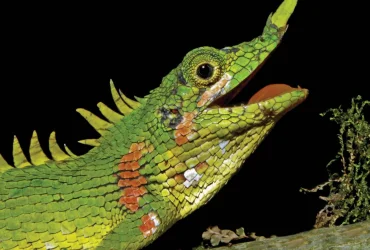 v9i1.222
v9i1.222ISSN: 1800-427X (printed)
eISSN: 1800-427X (online)
DOI:10.47605/tapro.v9i1.222
Submitted date: 01 December 2019
Accepted date: 30 April 2020
Published date: 21 May 2020
Pp. 59–70, pls. 22–24.
A NEW BENT-TOED GECKO SPECIES OF THE GENUS Cyrtodactylus GRAY, 1827 (SQUAMATA : GEKKONIDAE) FROM THE WEST BALI NATIONAL PARK, BALI, INDONESIA
A.A. Thasun Amarasinghe*, Awal Riyanto, Mumpuni & Lee L. Grismer
*Corresponding author. E-mail: thasun@rccc.ui.ac.id
Abstract
A new bent-toed gecko species of the genus Cyrtodactylus is described herein from West Bali National Park on the island of Bali, Indonesia. The Cyrtodactylus from Bali have been recognized as C. fumosus for nearly a century. However, recent detailed examination of the type material of C. fumosus has revealed that Balinese Cyrtodactylus represent at least one different species. A morphological examination of the new species and samples from different biogeographic regions revealed that the new species is similar to C. seribuatensis from Pulau Seribuat in West Malaysia. Morphologically, the new species can be distinguished from its congener by having 40–43 femoro-precloacal pores (vs 10–12 precloacal pores, 14–16 femoral pores), 40–48 ventral scales between ventrolateral folds (vs 28–39), 24–29 rows of dorsal tubercles (vs 27–35), and presence of tubercles on lateral skinfold (vs absent).
Key words : Cyrtodactylus fumosus, Sundaland, Taman Nasional Bali Barat, taxonomy
Section Editor: Aaron Bauer
LSID:urn:lsid:zoobank.org
eISSN: 1800-427X (online)
DOI:10.47605/tapro.v9i1.222
Submitted date: 01 December 2019
Accepted date: 30 April 2020
Published date: 21 May 2020
Pp. 59–70, pls. 22–24.
A NEW BENT-TOED GECKO SPECIES OF THE GENUS Cyrtodactylus GRAY, 1827 (SQUAMATA : GEKKONIDAE) FROM THE WEST BALI NATIONAL PARK, BALI, INDONESIA
A.A. Thasun Amarasinghe*, Awal Riyanto, Mumpuni & Lee L. Grismer
*Corresponding author. E-mail: thasun@rccc.ui.ac.id
Abstract
A new bent-toed gecko species of the genus Cyrtodactylus is described herein from West Bali National Park on the island of Bali, Indonesia. The Cyrtodactylus from Bali have been recognized as C. fumosus for nearly a century. However, recent detailed examination of the type material of C. fumosus has revealed that Balinese Cyrtodactylus represent at least one different species. A morphological examination of the new species and samples from different biogeographic regions revealed that the new species is similar to C. seribuatensis from Pulau Seribuat in West Malaysia. Morphologically, the new species can be distinguished from its congener by having 40–43 femoro-precloacal pores (vs 10–12 precloacal pores, 14–16 femoral pores), 40–48 ventral scales between ventrolateral folds (vs 28–39), 24–29 rows of dorsal tubercles (vs 27–35), and presence of tubercles on lateral skinfold (vs absent).
Key words : Cyrtodactylus fumosus, Sundaland, Taman Nasional Bali Barat, taxonomy
Section Editor: Aaron Bauer
LSID:urn:lsid:zoobank.org
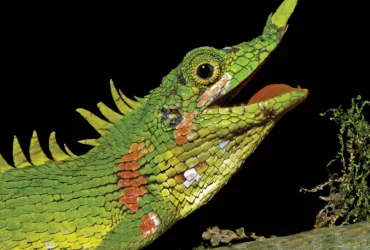 v9i1.221
v9i1.221ISSN: 1800-427X (printed)
eISSN: 1800-427X (online)
DOI:10.47605/tapro.v9i1.221
Submitted date: 05 April 2020
Accepted date: 30 April 2020
Published date: 21 May 2020
Pp. 50–58, pls. 19–21.
REDESCRIPTION OF Lycodon travancoricus (BEDDOME, 1870) (REPTILIA : COLUBRIDAE), AN INDIAN ENDEMIC SNAKE, WITH A REVIEW OF ITS GEOGRAPHIC RANGE
S.R. Ganesh, A.A. Thasun Amarasinghe & Gernot Vogel*
*Corresponding author. E-mail: gernot.vogel@t-online.de
Abstract
We redescribe the poorly-known peninsular India endemic colubrid snake Lycodon travancoricus based on its traceable syntype. We elaborate on the geographic range of the species and reveal its distribution in several disjunct hill ranges scattered across its range – the Western Ghats, the Eastern Ghats and the Central Indian Highlands. Discussions about a suggested relegation of its status as a subspecies of the widespread L. aulicus are revisited, in light of new knowledge on the species complex to which it belongs. Our perusal of extralimital records allocated to this species reveals frequent incorrect identification and provenance of specimens. Our results bolster the view that the existing diagnosis is sufficient to distinguish this species from regional congeners supporting its continued recognition as a valid species restricted to peninsular India.
Key words : distribution, Eastern Ghats, identification, Indian peninsula, syntype, Western Ghats
Section Editor: Ivan Ineich
LSID:urn:lsid:zoobank.org
eISSN: 1800-427X (online)
DOI:10.47605/tapro.v9i1.221
Submitted date: 05 April 2020
Accepted date: 30 April 2020
Published date: 21 May 2020
Pp. 50–58, pls. 19–21.
REDESCRIPTION OF Lycodon travancoricus (BEDDOME, 1870) (REPTILIA : COLUBRIDAE), AN INDIAN ENDEMIC SNAKE, WITH A REVIEW OF ITS GEOGRAPHIC RANGE
S.R. Ganesh, A.A. Thasun Amarasinghe & Gernot Vogel*
*Corresponding author. E-mail: gernot.vogel@t-online.de
Abstract
We redescribe the poorly-known peninsular India endemic colubrid snake Lycodon travancoricus based on its traceable syntype. We elaborate on the geographic range of the species and reveal its distribution in several disjunct hill ranges scattered across its range – the Western Ghats, the Eastern Ghats and the Central Indian Highlands. Discussions about a suggested relegation of its status as a subspecies of the widespread L. aulicus are revisited, in light of new knowledge on the species complex to which it belongs. Our perusal of extralimital records allocated to this species reveals frequent incorrect identification and provenance of specimens. Our results bolster the view that the existing diagnosis is sufficient to distinguish this species from regional congeners supporting its continued recognition as a valid species restricted to peninsular India.
Key words : distribution, Eastern Ghats, identification, Indian peninsula, syntype, Western Ghats
Section Editor: Ivan Ineich
LSID:urn:lsid:zoobank.org
Hubungi Kami
The ultimate aim of the journal is to provide an effective medium for communication of the latest and best scientific information.
Copyright © 2020 Taprobanica. All Rights Reserved
Jasa Pembuatan Website by IKT




